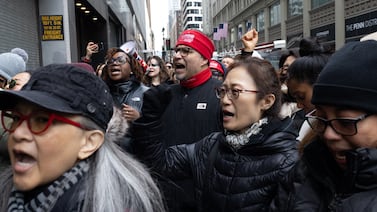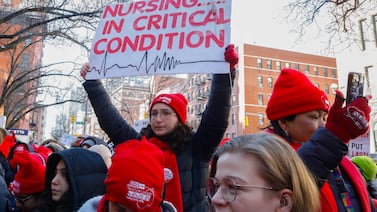This article originally appeared at Your Local Epidemiologist New York co-published with THE CITY. Sign up for the YLE NY newsletter here. Public health, explained: Sign up to receive Healthbeat’s free New York City newsletter here.
The New York City mayoral primary election is fast upon us: Election Day is June 24, and early voting is from Saturday to June 22. Polls across the city will be open June 24 from 6 a.m. to 9 p.m.

Here at YLE, we recognize that policymakers impact everything that touches your life, but we thought it would be helpful to take a look at one piece of that pie: policies that impact our health.
This is a guide (not an endorsement) that may be helpful to your research before you hit the polls.
Let’s back up. What does the mayor have to do with health?
In New York City, the mayor impacts health through policy, budgetary control, and agency oversight. The mayor appoints the health commissioner and sets priorities on issues like chronic disease, overdose prevention, mental health, vaccines, and emergency preparedness. The mayor also proposes the city budget, including funding for public hospitals (New York City has the largest public hospital system in the United States), community health programs, and things like access to healthy food and housing, which are social determinants of health. The mayor’s priorities have a large impact on what issues get resourced.
I’ve outlined what I see as the most pressing public health issues for New York City, and how current mayoral candidates plan to address those issues. (One note: current Mayor Eric Adams is running as an independent and is not part of this primary — we’ll include his information later, before the final election.)
I chose three topics that affect the most New Yorkers, and have the greatest potential to improve overall health across the city. (This is not all-encompassing — narrowing these topics down was tough! 😅)
Maintaining Medicaid and public health funding
In New York City, 40% of all people, 60% of children, and 50% of births rely on Medicaid for their health care coverage — that’s more than 4 million people.
Congress is actively debating a bill that would cut Medicaid, resulting in an estimated 8.6 million people losing coverage nationally, including 1.8 million in New York state, the majority of whom are children, older adults, and people with disabilities.
Additionally, New York City used to receive significantly more state funding for essential public health services. Currently, the New York City public health budget accounts for ~2% of the city’s total budget, down from ~3% previously. And, since a law change in 2019, New York City has lost $90 million a year in Article 6 funding (state funding for local health departments to pay for essential public health services).
What will the mayor do to prevent federal Medicaid cuts and advocate for public health funding? If Congress does cut Medicaid, what will the mayor do to ensure that New Yorkers maintain health care coverage and access to medical care?
What the candidates support
Most candidates acknowledge the importance of Medicaid and public health funding. Adrienne Adams, Michael Blake, and Brad Lander support expanding them through strategies like higher reimbursement rates, new funding streams, or wider eligibility criteria. Andrew Cuomo, Zellnor Myrie, and Scott Stringer focus on maintaining current funding levels and preventing federal cuts, but don’t propose expansions. Zohran Mamdani and Jessica Ramos have not taken clear positions in their mayoral platforms, though both have supported relevant legislation previously.
Reducing mental health issues and addiction
Rising mental health issues, especially among teens, and high overdose rates are crises in New York. Both were exacerbated by the Covid-19 pandemic.
In 2022, 13% of adult New Yorkers reported having depression and 1 in 4 reported having anxiety. In 2021, about 1 in 10 (9%) of New York City public high school students reported a suicide attempt, and 41% and 42% of Black and Latino teens, respectively, felt sad and hopeless. Amongst teen girls, 27% reported non-suicidal self-injury.
Overdose deaths in New York City declined in the first half of 2024. (We’re still collecting data on the second half, given a lag in death certificates.) However, the number is still extremely high: Every four hours, a New Yorker dies of a drug overdose, primarily due to fentanyl. In the first half of 2024, there were 1,184 overdose deaths in New York City — fewer than the 1,525 deaths during the same period in 2023. They occurred most frequently in the Bronx, Upper Manhattan, and Central Brooklyn.
How will the mayor combat the mental health and overdose crises? How will they ensure that all New Yorkers have access to mental health care and substance use recovery services?
What the candidates support
All candidates include policy plans that support expanding access to mental health care for at least some individuals. They all recognize the issue and support better mental health treatment, though some only focus on those with severe mental illness, while others focus on the general public.
Additionally, Adrienne Adams, Michael Blake, Andrew Cuomo, and Scott Stringer support expanding access to substance use disorder treatment and/or harm reduction.
Improving maternal health
Maternal mortality is a huge issue in New York. One woman dies of pregnancy-associated factors each week in New York City, on average. The majority of these deaths are preventable. And the risk is not uniform. Black women in New York City are three times more likely to die when pregnant (or soon after delivery) compared with white women. Disparities are also seen in infant health. The infant mortality rate for babies born to Black mothers is 2.4 times the average New York state rate. Unfortunately, there has been little improvement in these gaps over the past two decades. Mortality for Black pregnant women in New York has consistently remained higher than the national average for Black pregnant women.
How will the mayor improve the health and outcomes of our New York moms and babies? How will the mayor direct resources toward moms with the greatest need and highest risk?
What the candidates support
Several candidates propose expanding maternal health programs, especially to reduce racial disparities. Adrienne Adams, Michael Blake, Brad Lander, and Zellnor Myrie offer detailed plans to expand care, like increasing access to doulas, midwives, or nurse home visits. Andrew Cuomo and Zohran Mamdani support maintaining existing programs, while Jessica Ramos and Scott Stringer have not outlined clear approaches in their mayoral plans, though they both have previously supported policies to improve this issue.
The next New York City mayor will help shape the city’s health — not just through emergency response like we saw during the pandemic, but through long-term, structural decisions about who gets care and how. The issues presented here — Medicaid and public health funding, mental health and the overdose crises, and maternal mortality — are not new. But they are urgent. And how we address them now will echo for generations to come.
The good news is that all candidates recognize these problems to some degree. But their plans vary widely — from incremental reforms to systemic overhauls.
When you cast your vote this month, you’re not just voting for a person. You’re helping decide how New York prioritizes health and the systems that shape our well-being. Your voice has a lot of power.
I’ll see you at the polls.
Love,
Your NY Epi
Candidate deep dive: specific policy proposals and past record
Maintaining Medicaid and public health funding
- Adrienne Adams: Adams supports expanding Medicaid eligibility and benefits where possible and increasing city and state funding to meet community public health needs.
- Past record: She has advocated protecting Medicaid in New York City and reinstating Article 6 funding for the city.
- Michael Blake: He proposes expanding Medicaid and Medicare funding and using city resources to supplement them. He states he will push for Medicaid carve-outs and matching funds that keep behavioral health services fully funded, especially for undocumented New Yorkers, gig workers, and those falling through traditional coverage gaps.
- Past record: He co-sponsored a bill that would ensure that New Yorkers holding Temporary Protected Status or Deferred Action for Childhood Arrivals continue receiving Medicaid, even if their federal immigration status changes or ends.
- Andrew Cuomo: He states he will campaign nationally to maintain Medicaid funding.
- Past record: When he was governor, he supported the Affordable Care Act Medicaid expansion, which created the Essential plan. This expanded coverage to 1.5 million New Yorkers across the state. However, in 2019, under his leadership, the state reduced New York City’s public health funding (Article 6), which has cost the city about $90 million annually since. In 2020, he also proposed cutting state Medicaid funding in New York by $2.5 billion.
- Brad Lander: He opposes the federal cuts to Medicaid, having published analyses citing how impactful they would be for New Yorkers. Lander supports the New York Health Care Act, which aims to establish a single-payer health care system in the state.
- Past record: He has advocated for using additional revenue from the managed care tax to bolster Medicaid reimbursement rates.
- Zohran Mamdani: He has not outlined a specific Medicaid policy, though his stance on maintaining health care access for working-class New Yorkers implies that he’s against Medicaid cuts. He’s also against moving retired New Yorkers to Medicare Advantage plans. These Advantage plans are often cheaper, but they may reduce the quality of care and have narrower provider networks, reducing access. Keeping people on Medicare plans instead of Advantage plans would prioritize access to care over potential cost savings for patients. He also advocated for the New York Health Care Act, which would provide universal healthcare in New York City.
- Past record: He has co-sponsored a bill that would maintain Medicaid coverage for workers on strike.
- Zellnor Myrie: He opposes the federal cuts to Medicaid and supports the New York Health Care Act and expanding access to health care services, though details were not described.
- Past record: He has introduced legislation aimed at improving Medicaid reimbursement rates for safety-net hospitals.
- Jessica Ramos: She has not outlined a specific Medicaid policy for her mayoral plan, but supports access to affordable, high-quality health care for all New Yorkers.
- Past record: She has introduced legislation aimed at improving Medicaid reimbursement for medical equipment and improving Medicaid reimbursement rates for safety-net hospitals.
- Scott Stringer: He opposes cuts to Medicaid.
- Past record: He has conducted audits revealing inefficiencies in the city’s Medicaid reimbursement processes.
Reducing mental health issues and addiction
- Adrienne Adams: She supports expanding community-based mental health programs through the city’s first Mental Health Roadmap. She also supports investing in health-based programs that divert people with substance use disorders from the justice system and toward treatment, with a focus on racial equity.
- Past record: She voted for the New York City Council’s plan to expand school-based mental health support, including a peer-to-peer mental health program.
- Michael Blake: He supports improving neighborhood safety, community trust, and expanded access to culturally competent mental health care and wellness support across neighborhoods through his Health and Mental Health plan. He supports expanding mental health education in schools and increasing the availability of trauma-informed education and materials. Blake supports expanding Overdose Prevention Centers and harm-reduction strategies. These include using New York City opioid settlement funds to develop substance use treatment and implement involuntary commitment protocols paired with robust supportive services when all other options have been exhausted.
- Andrew Cuomo: He supports expanding access to mental health and substance use disorder services, particularly for those who are homeless, including increasing the number of supportive housing units for the seriously mentally ill. He also supports prioritizing schools as key access points for youth mental health services and increasing the number of mental health workers in the city, like child psychiatrists. He also supports involuntary commitment and hospitalization of individuals who present dangers to themselves and others due to mental health issues and the inability to meet their basic needs.
- Past record: When Cuomo was governor, he passed multiple laws to reduce the opioid epidemic and increase access to treatment. Cuomo supports expanding access to substance use treatment, but mostly from the lens of severe mental illness.
- Brad Lander: Lander’s mental health policy plans focus on those who are homeless and have severe mental illness. He supports expanding involuntary commitment and hospitalization, while emphasizing the importance of providing supportive housing to help reduce severe mental illness in New York City. He has not proposed policy to address mental health in general or for youth, nor to reduce substance use disorders and overdoses in New York City.
- Zohran Mamdani: Mamdani’s plans aim to establish a Department of Community Safety that would invest ~$350M in mental health services, expanding preventive and ongoing mental care, as well as crisis intervention for severe mental illness. His plan proposes establishing a Community Mental Health Navigators program across all neighborhoods that will help connect community members to mental health professionals, and expanding Peer Clubhouses, Teenspaces, and Adolescent Skills Centers. His plans aim to increase the number of mobile crisis teams and mental health professionals who respond to mental health crises, either through 911 or 988 calls, and ensure that neighborhoods with higher call rates have additional crisis teams. Mamdani has not proposed any policy to reduce substance use disorders and overdoses in New York City.
- Zellnor Myrie: He supports increasing Mental Health & Trauma Recovery Services, including a long-overdue full-service trauma center in the Rockaways, and expanding Black men’s mental health programs, including free therapy, mentorship, and career pathways for those impacted by violence. Myrie has not proposed any policy to reduce substance use disorders and overdoses in New York City.
- Jessica Ramos: She plans to declare mental health a city emergency, which could open up additional funding streams. She has drafted an initiative called Harmony NYC that aims to expand mental health services. The plan includes implementing universal mental health screening in public schools, building 20 new mental health and wellness centers, and deploying 10 new mobile mental health teams in underserved neighborhoods. It also plans to expand supportive housing for the most severe cases of mental illness. She has also stated that involuntary commitment of those with severe mental illness is sometimes necessary. Ramos has not proposed any policy to reduce substance use disorders and overdoses in New York City.
- Scott Stringer: He supports expanding the number of mental health professionals who work with police officers to respond to mental health crises, and increasing supportive housing for those with mental illness or substance use disorders.
Improving maternal health
- Adrienne Adams: She called for New York City to confront maternal mortality as a public health crisis last October.
- Past record: She convened the City Council Maternal Health Steering Committee to tackle racial disparities in health care and led the passage of multiple laws that increase maternal health resources to combat maternal mortality disparities affecting Black and Latina women, including greater access to doulas, maternal mental health support, and guaranteed income for expecting mothers experiencing housing insecurity.
- Michael Blake: He supports securing paid family leave for all workers, including policies that address disparities among Black and Latina women caring for newborns and other family members. He plans to expand and diversify the perinatal workforce (health staff who work with those about to deliver babies and just after) to improve maternal health outcomes, focusing on culturally competent care for Black women and other vulnerable populations. Blake also supports protecting access to reproductive rights.
- Andrew Cuomo: He has stated he wants to establish programs to reduce maternal health disparities as part of his campaign, though he includes no details.
- Past record: While he was governor, the Taskforce on Maternal Mortality and Disparate Racial Outcomes was created to reduce maternal mortality and racial disparities. Following the task force, Cuomo committed to implementing their recommendations, including establishing a Maternal Mortality Review Board, creating an implicit racial bias training and education program for hospitals, creating a data warehouse on perinatal outcomes, and requiring insurance companies to cover maternal depression screenings.
- Brad Lander: He has released a plan to reduce maternal mortality and associated disparities that includes doubling the doula workforce, increasing the number of midwives in New York City, expanding the Nurse Family Partnership home visiting program, and launching midwife-led birth centers. He supports increasing anti-bias training in hospitals and access to reproductive rights.
- Past record: During his time as comptroller, his analysis found that the NYC Doula Initiative, which increases access to doulas, improved birth and health outcomes for Black and Hispanic mothers.
- Zohran Mamdani: He proposes providing new parents with baby baskets that contain essential goods and resources, like diapers and baby wipes, and information on newborn home visiting programs, breastfeeding, and postpartum depression. His plan does not detail other approaches to reducing maternal mortality.
- Zellnor Myrie: He has put forward a plan to reduce Black maternal mortality by funding maternal health and birthing centers in majority Black neighborhoods and advocating to expand coverage of doula and midwifery services under Medicaid.
- Jessica Ramos: Her mayoral plan does not detail approaches to reducing maternal mortality.
- Past record: She has co-sponsored bills aimed at reducing maternal mortality, including establishing a C-section review board as part of the Maternal Mortality Review Board, providing income to mothers in the last three months of pregnancy and the first 18 months of the child’s life, and expanding disability insurance for new mothers.
- Scott Stringer: His mayoral plan does not detail approaches to reducing maternal mortality.
- Past record: As comptroller in 2015, Stringer recommended that all pregnant women should qualify for healthcare coverage and recommended that pregnancy be considered a qualifying event.
Dr. Marisa Donnelly, PhD, is an epidemiologist, science communicator, and public health advocate. She specializes in infectious diseases, outbreak response, and emerging health threats. She has led multiple outbreak investigations at the California Department of Public Health and served as an Epidemic Intelligence Service Officer at the Centers for Disease Control and Prevention. Donnelly is also an epidemiologist at Biobot Analytics, where she works at the forefront of wastewater-based disease surveillance.






